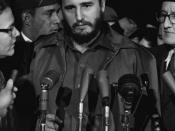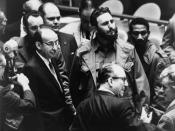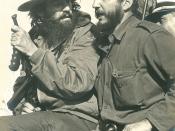Castro was born on Aug. 13, 1926 on a farm in Mayari municipality in the province of Oriente. He attended good Catholic schools in Santiago de Cuba and Havana, where he took to the spartan regime at a Jesuit boarding school, Colegio de Belen. In 1945 he enrolled at the University of Havana, graduating in 1950 with a law degree. He married Mirta Diaz-Balart in 1948, but they were divorced in 1954. Their son, Fidel Castro Diaz-Balart, born in 1949, has served ashead of Cuba's atomic energy commission. A member of the social-democratic Ortodoxo party in the late 1940s and early 1950s, Castro was an early and vocal opponent of the dictatorship of Fulgencio Batista. On July 26, 1953, Castro led an attack on the Moncada army barracks that failed but brought him national prominence. At the time, his political ideas were nationalistic, antiimperialist, and reformist; he was not a member of the Communist party.
Following the attack on Moncada, Castro was tried and sentenced to 15 years in prison but was amnestied in 1955. He then went into exile in Mexico, where he founded the 26th of July Movement, vowing to return to Cuba in order to fight against Batista. In December 1956, he and 81 others, including Che Guevara, returned to Cuba and made their way to the Sierra Maestra, from which they launched a successful guerrilla war. Castro proved himself a strong leader; he also demonstrated shrewd political skills, convinced that he had a historic duty to change the character of Cuban society. Seeing his army collapse, and unable to count on the support of the United States, Batista fled on Jan. 1, 1959, paving the way for Castro's rise to power. In its early phase, Castro's revolutionary regime included moderate politicians and democrats; gradually, however, its...


